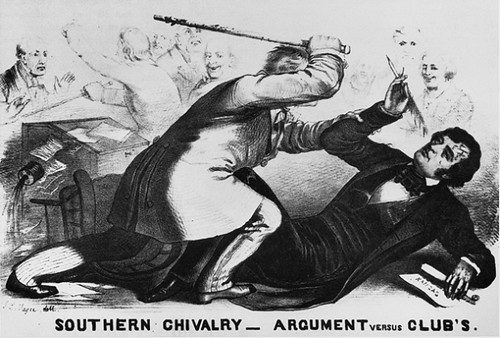I hear and read cries of people being “tired” of all this partisanship. The president, the press, and pundits claiming that “Never Before has the house/senate been so partisan, so uncivil, yada yada yada.” This is unmitigated Bolderdash. Today’s politicians are virtual bastions of etiquette, following in the footsteps of Emily Post compared to the speech and actions in the History of US Legislative and presidential discourse.
First consider the death of one of our most famous forefathers, Alexander Hamilton. Aaron Burr, the Al Gore of his day, lost the US presidential election in 1800 by a handful of votes. Thomas Jefferson was elected instead and made his defeated opponent Vice President. Burr blamed his defeat on Alexander Hamilton, one of the great figures of the American Revolution. Hamilton – a close friend of Washington, co-framer of the constitution and a former head of the army – had successfully persuaded a tied electoral college to swing behind Jefferson. so when Vice President Burr discovered a few years later that Hamilton had bad-mouthed him in a later, he issued an instant challenge. Hamilton – by then retired from politics – was opposed to dueling on moral and religious grounds, but the duty of honor was greater and so, on July 11, 1804, both men crossed the River Hudson with their seconds to what is now New Jersey. Burr was determined to shot his rival dead, which he did. Hamilton, as he was shot, discharged his own pistol into the ground. There was huge public revulsion at the death of such a popular figure and the Vice President found himself on the receiving end of some seriously bad headlines. He was deprived of his New York citizenship and forced in to hiding. In later years, he was shunned by society and died destitute n Staten Island in 1836.

Although he is ranting and raving a lot, I don’t see Al Gore challenging Dick Chaney or anybody else to a duel, much less killing those who words caused him political harm.
Now let’s consider the legislature, specifically that noble and dignified body the US Senate. On May 19, 1856, Republican Senator Charles Sumner gave his famous "Crime Against Kansas" speech in the well of the Senate. In his over three hour oration, Sumner attack Senators Stephen A. Douglas of Illinois and Andrew Butler of South Carolina, both pro-slavery. His attack on Butler was especially harsh and made fun of the Senator's speech defect.
Two days later, fellow senator, Democrat Preston Brooks, nephew of Congressman Butler, approached Sumner while the latter was writing at his desk in the Senate chamber. The room was nearly empty, but there were enough people present that an accurate account of what happened could later be assembled. Brooks approached the sitting Senator and said "Mr. Sumner, I have read your speech twice over carefully. It is a libel on South Carolina, and Mr. Butler, who is a relative of mine." With that, he began beating Sumner on the head with his heavy cane, which was topped with a gold head. Sumner could not rise up as his desk was bolted to the floor. Brooks continued to beat him until Sumner tore the desk from the floor and staggered up the aisle away from his attacker, blinded by his own blood. He collapsed in the middle of the aisle, at which time Brooks continued his attack until his cane broke in two. Several senators tried to intercede on Sumner's behalf, but Congressman Laurence Keitt of South Carolina, an ally of Brooks, stood by the men with a pistol drawn and shouted "Let them be!"

Senator Sumner took three years to recover from his wounds. The Massachusetts General Court reelected him in November 1856 anyway, believing that his vacant chair in the Senate chamber served as a powerful symbol of free speech and resistance to slavery. Congressman Brooks became sort of a hero in the South, a symbol of that area's resistance to perceived bullying from the North. Northerners were outraged. Senator Sumner, elected to his seat as a Republican, became a symbol for anti-slavery forces. Congressman Brooks was subject to an expulsion vote in the House of Representatives that did not pass, but nonetheless gave up his seat for the rest of his term. The people of South Caroline promptly re-elected him at the next election. In honor of Brooks, Pierceville, a small Florida town located near the site of Ft. Desoto, changed it's name to Brooksville. Both men remained in their offices for the rest of their lives.
Simply put, politician’s calls for more civility are just political drama, used to avoid having to answer tough questions. What today is called uncivil discourse is milquetoast compared to our history. What we need are not politicians who won't say what they think, and provide us safe middle of the road platitudes. We need bold politicians who are not affraid to say what they believe, stand up to those whom they don't agree, and let the votes fall where they will. We have a man who running for president right now who has remained stedfast in his beliefs, and not affraid to tell not only the other party but his own party what he believes. That's Ron Paul.





No comments:
Post a Comment